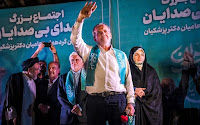The strikes come as international mediators are working to
bring Israel and Hamas to agree to a cease-fire that would wind down the
devastating war in Gaza and free hostages. Intense diplomatic efforts are also
underway to ease tensions between Israel and Hezbollah after months of cross-border
fighting.
The assassination of Hamas’ top leader Ismail Haniyeh in
Tehran and the strike against senior Hezbollah commander Fouad Shukur in
Beirut could upend those painstaking attempts to defuse a Middle East powder
keg. Iran has also threatened to respond after the attack on its territory,
which could drag the region into all-out war.
Here’s a look at the potential fallout from the strikes:
Gaza
cease-fire negotiations
Haniyeh’s assassination could prompt Hamas to pull out
of cease-fire negotiations being mediated by the United States, Egypt
and Qatar, though it has yet to comment on the issue.
But given Haniyeh’s role, a senior Egyptian official with
direct knowledge of the negotiations said the killing will highly likely have
an impact, calling it “a reckless act.”
“Haniyeh was the main link with (Hamas) leaders inside Gaza,
and with other Palestinian factions,” said the official, who met with the Hamas
leader multiple times in the talks. “He was the one we were meeting
face-to-face and talking about the cease-fire.”
Qatari Prime Minister Mohammed Bin Abdul Rahman
al-Thani condemned the attacks.
“How can mediation succeed when one party assassinates the
negotiator on the other side?” he wrote on the social media platform X.
US Secretary of State Antony Blinken said he didn’t want to
speculate on the effect, but the events renewed the “imperative of getting the
cease-fire,” which he said they are working toward on a daily basis
Hezbollah has said that it will halt its fire on Israel if a
Gaza cease-fire is reached.
Israeli Prime Minister Benjamin Netanyahu has argued that
military pressure will prompt Hamas to agree to a deal, but previous killings
of senior figures have not appeared to increase the chances for an agreement.
People in Gaza expressed sadness and shock over Haniyeh’s
killing and worried that a cease-fire deal was slipping away.
“By assassinating Haniyeh, they are destroying everything,”
said Nour Abu Salam, a displaced Palestinian. “They don’t want peace. They
don’t want a deal.”
The increasingly desperate families of hostages held in
Gaza urged for their loved ones to be released.
“I’m not interested in this assassination or that
assassination, I’m interested in the return of my son and the rest of the
hostages, safe and sound, home,” said Dani Miran, whose son Omri, 46, was
kidnapped from Kibbutz Nahal Oz on October 07, 2023.
Risk of
broader war
The strikes also raised alarm among some diplomats working
to defuse tensions in the region.
“The events in Tehran and Beirut push the entire Middle East
to a devastating regional war,” said one Western diplomat.
The diplomat — whose government has engaged in concerted
diplomacy to prevent an all-out war between Israel and Hezbollah, but is not
directly involved in cease-fire or hostage negotiations — called the killing of
Haniyeh a “serious development” that has “almost killed” a possible cease-fire
in Gaza, given its timing and location.
She said that Haniyeh’s killing inside Tehran while
attending the inauguration of an Iranian president “will force Tehran to
respond.”
The assassination in Tehran is not the first time that
Israel has been blamed for a targeted attack on Iranian soil, but it’s one of
the most brazen, said Menachem Merhavy, an expert on Iran from the Hebrew
University of Jerusalem.
Israel hasn’t taken responsibility for the strike, though it
vowed to kill all of Hamas’ leaders over the Oct. 7 attacks. Merhavy thinks
it’s unlikely that Iran will respond directly to Israel, such as with the
barrage of 300 rockets in April after a suspected Israeli strike in Syria
that killed two Iranian generals in an Iranian consular building.
He believes Iran is more likely to send its response via
Hezbollah.
“Iran knows that its capability of hurting Israel is much
more significant from Lebanon,” said Merhavy.
The location of Haniyeh’s assassination was just as
important as the strike itself, he said.
“The message was to Iran and the proxies, if you thought in
Tehran you’re protected, we can reach you there as well,” said Merhavy.
“Reconsider your relations with Tehran, because they cannot protect you on its
own soil.”
Finding the replacement
Although Haniyeh’s name has more international recognition,
the strike on Hezbollah commander Fouad Shukur, if successful, is “much more
important from a functional point of view,” said Michael Milshtein, an Israeli
analyst of Palestinian affairs at Tel Aviv University and a former military
intelligence officer.
He said Shukur was involved in the day-to-day management of
Hezbollah’s strikes on Israel, including, according to Israel, the rocket
attack on Majdal Shams that killed 12 youths on Saturday. Israel said its hit
in Beirut on Tuesday killed him but Hezbollah has not confirmed that.
“If Hezbollah is considering how to act or to respond, one
of the main question marks is how they’re going to manage a war without
Shukur,” said Milshtein.
Others said Shukur, if he is in fact killed, will easily be
replaced.
“Hezbollah has thick layers of commanders and leaders, and
the killing of 1 or 10 or 500 will not change the equation,” said Fawaz Gerges,
of the London School of Economics.
Gerges said Haniyeh is a much more symbolic leader and is
far removed from the day-to-day operations in Gaza.
“Even though the assassination of Haniyeh is a painful blow
for Hamas, it will make no difference in the military confrontation between
Israel and Hamas,” and Gerges.
He noted that Israel has a long history of
assassinating leaders of Palestinian groups, but those strikes have little
impact as the leaders are quickly replaced.
Courtesy: Associated Press


















